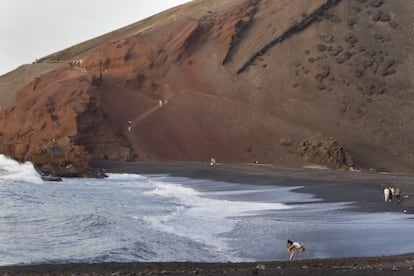Lanzarote cites Repsol’s own recognition of oil spill danger
Energy company investigation describes risk of blowout as "moderate"

The island council of Lanzarote is continuing to rally public opposition to plans by Spanish energy giant Repsol to explore for oil in waters off the easternmost extreme of the Canary Islands. Lanzarote's administration has gone public with an environmental impact report produced by Repsol itself outlining the "worst case scenario" involving an oil spill. The council has posted the text online.
"The oil consortium recognizes one of the most important dangers highlighted systematically by those opposed to the exploration project: the implicit risk of spills washing ashore on the Canary Islands' beaches," reads a text published on the local government's website.
The local council quotes the Repsol report: "In short, taking into account the worst case scenario and the associated probability of a blowout [...] we believe that the environmental and social risks of a spill caused by a blowout on the coast, with disastrous consequences, and in the absence of preventative measures, are moderate."
Despite that assessment by Repsol, the council responds by saying: "In the face of the manifest evidence of the risk that the exploration could create in the Canary Islands, the decision to suspend indefinitely the project should be taken immediately."
In 2012, the Spanish government authorized oil drilling off the Canary Islands, which receives some nine million visitors a year, making it one of Europe's most popular tourist destinations. The government argued that it would help to ease dependence on crude imports. Spain imports more than 99 percent of its oil.
Repsol has played down fears of a spill, and says the site it is eyeing off Lanzarote could mark the biggest hydrocarbon find in Spanish history. It says it expects to start drilling next year.
The plan was first approved in 2001. The Canary Islands regional government sued then and the Supreme Court annulled the permit on a technicality, in 2004. When Repsol refiled its plan, the Socialist Party was in power in Madrid, and shelved the blueprint.
The two wells Repsol plans to drill 35 miles east of the Canary island of Lanzarote could yield as much as 100,000 barrels of oil per day, says Repsol, which estimates that the Canary Islands could meet 10 percent of Spain's hydrocarbon needs. Repsol's environmental impact report says that the chance of a blowout is one in 50,000, and that even in the event of such an accident, it has adequate safety and prevention measures in place. Were an accident to take place, it adds, any oil spill would likely affect Africa's coastline.







































